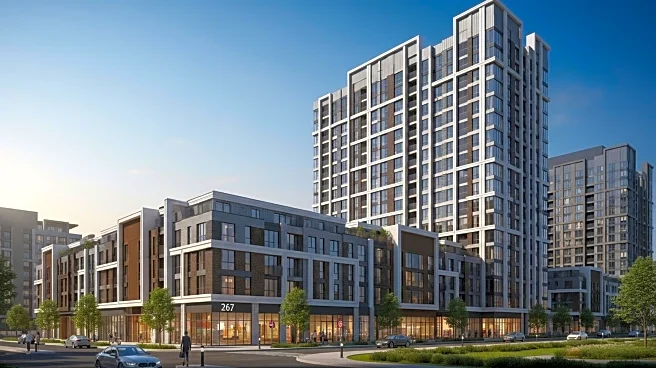What's Happening?
Alpine Residential, a New York-based company, is set to purchase the former Crowne Plaza hotel property in Cromwell, Connecticut, with plans to demolish the existing structure and construct 267 apartments. The site, once a popular venue for conventions and weddings, has been deteriorating since its closure in January 2020. Alpine's proposal includes two five-story buildings with a mix of studio, one-bedroom, two-bedroom, and three-bedroom units, along with a 12,000-square-foot courtyard featuring a pool. The plan also reduces the originally proposed retail space from 30,000 square feet to 13,000 square feet. The redevelopment reflects a shift in market demand, favoring residential over commercial space.
Why It's Important?
The redevelopment of the former hotel site into residential apartments is significant as it addresses the changing dynamics in real estate demand, particularly the shift from retail to residential spaces. This project could provide much-needed housing in the area, potentially boosting local economic activity and revitalizing the community. The reduction in retail space aligns with broader trends in mixed-use developments, where residential demand is outpacing commercial needs. The project also highlights the challenges and opportunities in repurposing defunct properties, offering insights into urban planning and development strategies.
What's Next?
Alpine Residential plans to begin demolition in the first quarter of 2026, with construction expected to follow in the next building season. The project will require approval from the Planning and Zoning Commission, and further amendments to the zoning permit originally granted to Lexington Partners. Stakeholders, including local government and community members, will likely monitor the project's progress and its impact on the local housing market. The development could set a precedent for similar projects in the region, influencing future real estate strategies.
Beyond the Headlines
The transformation of the former hotel site into residential apartments raises questions about the sustainability and adaptability of urban spaces. It reflects a broader trend of repurposing underutilized properties to meet current housing demands. This shift may lead to discussions on the balance between preserving historical landmarks and accommodating modern needs. Additionally, the project could influence local infrastructure and services, necessitating adjustments to accommodate increased residential density.










